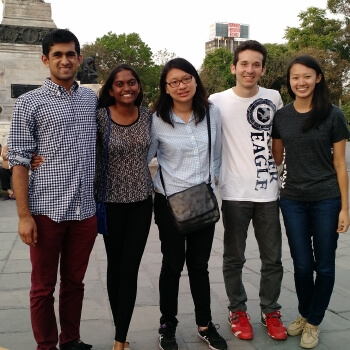News
Tech in the World Fellows (from left) Neel Mehta, A.B. '18, Saranya Vijayakumar, A.B. ’18, Annie Wei, A.B. ’16, Francisco Rivera, A.B. ’19, and Fanney Zhu, A.B. ’17. (Photo provided by Neel Mehta.)
Tech in the World Fellows (from left) Neel Mehta, A.B. '18, Saranya Vijayakumar, A.B. ’18, Annie Wei, A.B. ’16, Francisco Rivera, A.B. ’19, and Fanney Zhu, A.B. ’17. (Photo provided by Neel Mehta.)
In the crowded slums of Peru, health care providers are frantically fighting to stem the spread of the world’s deadliest infectious disease: tuberculosis. For three weeks in January, a team of students joined the fight.
Neel Mehta, A.B. ’18, a computer science concentrator, Francisco Rivera, A.B. ’19, an applied math concentrator, Saranya Vijayakumar, A.B. ’18, a computer science and government concentrator, Annie Wei, A.B. ’16, a computer science and physics concentrator, and Fanney Zhu, A.B. ’17, a computer science concentrator, traveled to Lima, Peru’s capital, to help develop a mobile app aimed at streamlining TB treatment. Fellows in the Tech in the World program, sponsored by the Harvard John A. Paulson School of Engineering and Applied Sciences club Developers for Development, the students collaborated with the nonprofit health agency Socios en Salud on the project.
Socios en Salud, closely affiliated with the Harvard-supported organization Partners in Health and the Peruvian ministry of health, provides free TB treatment for thousands of patients each day. The organization uses an Android app to check in patients when they arrive for each treatment. Infected patients must take medication every day for six to nine months or they run the risk of developing a lethal, drug-resistant strain of TB.
The impoverished neighborhood on Lima's San Cristobal hill. (Diego Delso, Wikimedia Commons, License CC-BY-SA 4.)
To simplify the complicated check-in process, the students developed a fingerprint-scanning feature for the app. Once a patient’s fingerprint is scanned, the app instantly provides patient information for the health care provider, including scheduled and missed appointments and treatment recommendations. The app enables a user to log a patient visit with just one tap.
“TB is such a prevalent disease, a doctor might have 100 people lined up outside the door for treatment. Logging patients quickly with just a fingerprint helps that doctor treat as many patients as possible,” said Rivera.
Treatment is further complicated because patients don’t always visit the same health center each day, explained Vijayakumar. One third of Peru’s 30 million people live in poverty and many lack the means to travel regularly for consistent medical care. Others are so sick with TB they are unable to walk to their nearest health centers. Socios en Salud sends health care providers into impoverished communities to provide care, but the lack of consistency makes record keeping very challenging.
“Without this technology, it is a mess of paper. It is impossible to tell who has come for treatment, when their last appointment was, and, most importantly, which patients have not been keeping up with their treatments,” said Mehta.
The fingerprint scanner the students develop enables a health care provider to log a patient's appointment with just one tap.
While understanding the multifaceted issues involved in TB treatment was challenging for the students, developing the app also included its share of obstacles. Working against the clock, they wrote complicated code that enabled the app to communicate with a central database of patient information. They were forced to make difficult choices about which features they had time to implement.
Mehta and his colleagues are proud of the quick check-in feature they developed. The nonprofit will soon begin field-testing the app and could incorporate it into treatment protocols in a matter of months.
The knowledge that their work could help save the lives of patients who are sick and suffering is very rewarding, said Wei.
“As students, we tend to focus mainly on ourselves and things that benefit us,” Zhu said. “But working with this nonprofit in Peru, it was very eye-opening to see how much we can impact the world. For me, it raises the question: What more can we do to help people, here in the U.S. and globally?”
Lima, Peru's capital, a city of more than 8 million people, is located in the central coastal part of the South American nation. (Photo courtesy of Juanity41, Wikimedia Commons.)
Cutting-edge science delivered direct to your inbox.
Join the Harvard SEAS mailing list.
Press Contact
Adam Zewe | 617-496-5878 | azewe@seas.harvard.edu
